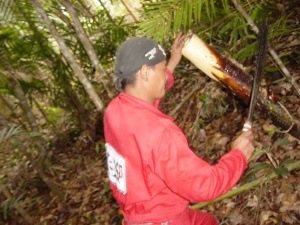Kenangan

Photo by J.Kokshoorn (Dec 2003)
Common Name/s
- Kelabit
- Kenangan (Kanangan)
- Kenangan Budaq
- Kenangan Siaq
- English
- Bornean Sago Palm
- Bahasa Malaysia
- Sagu
Scientific name
- Eugeissonia utilis (1)
Uses
- A most unusual, densely clustering, large palm that grows to about 20 m (67 ft.) tall. Native to the island of Borneo, it forms extensive thickets in tropical rain or heath forest. The suckering trunks are supported by a large number of strong stilt roots. The large crown bears numerous upright to spreading leaves with spiny midribs and elegantly arching leaflets. Each trunk in a cluster flowers only once with a large terminal inflorescence. The fruits are large and covered in small, fringed scales. The seeds are protected by a very hard shell. All parts of the palm are used extensively by local people for construction purposes and thatching. The starchy pith of the trunk is extracted as sago. (2)
- Only very seldom do the Kelabits extract the sago from the palm, they prefer to eat the young palm shoots, eaten as vegetable(1) (ubud kenangan)
- The palm wood (usually of the dead palm) is host to the edible larvae (u'et kenangan)(1), considered a delicacy.
- The leaves may be used as roofing material (apo kenangan), but this is rarely seen nowadays.(1)
- The leaf rachis is used as pith flight on the langan.(1)
- The dead leaves are used as bee repellent on honey collecting trips(1)
- The leaves are medicinal, these are plaited together to form a little container to cook rice. This is good for chilren to eat.(1)
References
- Ethnobotany of the Iban & Kelabit by Hanne Christensen
- www.rarepalmseeds.com